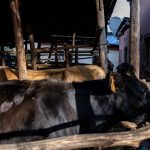In an era defined by the growing threat of climate change, our ability to adapt and thrive hinges on a critical factor that often goes unnoticed: cooling. We need to recognise that cooling is critical infrastructure*, as vital as potable water and mobility. It underpins the fundamentals of our society - food, vaccines and health; safe environments in which to live, work, learn and play, as well as the modern digital systems that we depend on. And as we confront the escalating impacts of climate change, cooling provision will necessarily be at the core systemic resilience strategies** to adapt to this new “hot reality”.
12% of global food and 25% of vaccine doses are lost globally due to lack of robust cold-chains.
The number of people at high risk from lack of cooling remains steadfastly above 1 billion people and grows annually.
Heat stress is expected to reduce economic productivity - declining by as much as 12% in South Asia and West Africa by 2050, which may potentially result in up to a 6% GDP loss annually.
At the same time, cooling emissions account for more than 10% of anthropogenic emissions and are the fastest growing source of greenhouse gases.
Less than a third of households around the world owned an air conditioner in 2018, but two in every three households are expected to have one by 2050 increasing the global electricity demand for space cooling by 300% in 2050 relative to 2016 levels.
Given today’s social and economic needs for cooling and cold-chain; the projected growth in global population; climate change impacts, but also the environmental risks, there is a clear and present urgency for governments, development agencies and the private sector to develop and deploy cooling solutions that are:

Sustainable

Affordable

Equitable

Resilient
How can we provide equitable and resilient cooling and cold-chains for all in a warming world whilst ensuring minimum environmental impact and no fossil fuel usage?
To deliver cooling for all in a sustainable and resilient manner, there needs to be a paradigm shift to a different way of thinking that goes beyond simply taking business-as-normal action, underpinned with efforts to reduce energy consumption and to use energy-efficient technologies with low-GWP refrigerants.
The Centre for Sustainable Cooling (CSC) is a first of a kind centre established to take an holistic systems approach to delivering sustainable and resilient cooling and cold-chain for all. Although CSC has a strong technological and energy underpinning, to bridge the gap between technological breakthroughs and practical implementation we place equal focus on the essential non-technological aspects - finance, business models, policy and behavioural challenges. Solutions need not only to be technologically sound but financeable, integrated into processes, underpinned by skilled workforces, enabled by the right policies and be accepted by end users.
We are also developing the evidence, frameworks, tools and strategies to help prioritise and increase the level of investment and government support into the development of sustainable and resilient cold-chain as critical infrastructure, including better understanding of the impacts of key uncertainties and risks as well as the multiple socio-economic benefits.
And through a network of Centres of Excellence developed with in-country partners – the first of which are in Africa and India - we deliver on the ground support to test and showcase solutions in practical, real-world applications and provide the on-site and outreach learning, training and knowledge transfer and technical assistance centres to support local community uptake.
*The European Commission defines ‘Critical Infrastructure’ as an asset or system which is essential for the maintenance of vital societal functions and states that damage to such infrastructure, its destruction or disruption, may have a significant negative impact for the security of the EU and the well-being of its citizens.
**Systemic Resilience is a property of an infrastructure system that arises dynamically when the national infrastructure is organised in such a way that it can provide agreed critical services despite endogenous and/or exogenous hazards, and despite the addition, modification and removal of infrastructure components. - Principles for Resilient Infrastructure, UNDRR (2022).